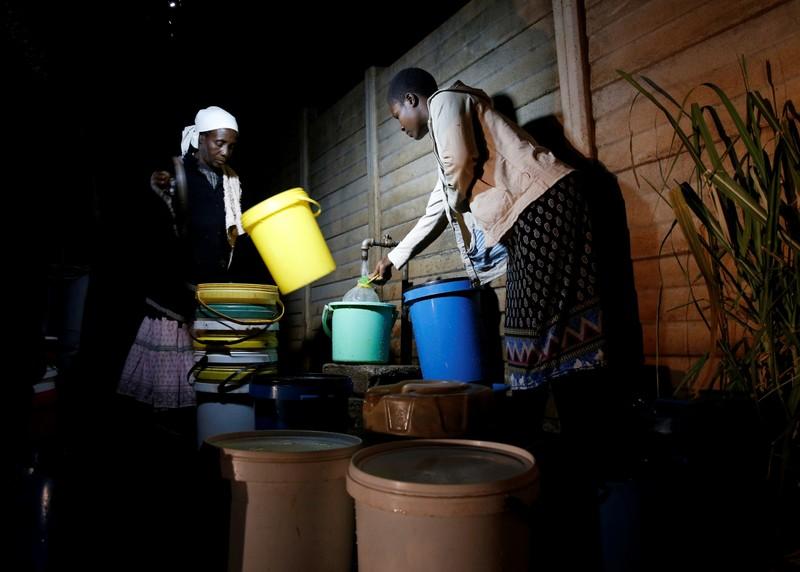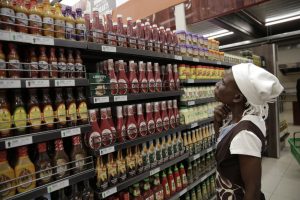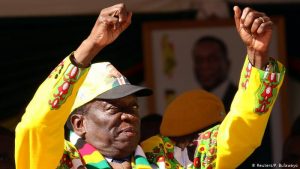
FILE PHOTO: Residents collect water at night from an electric-powered borehole, as the country faces 18-hour daily power cuts, in a suburb of Harare, Zimbabwe, July 30, 2019. REUTERS/Philimon Bulawayo
The city has since late November imposed 96-hour dry periods for residential water customers, though industrial and business users have continued to receive service, according to the Bulawayo City Council.
An extended drought has reduced supplies of stored water, forcing the city to decommission two of its major supply dams, said Nesisa Mpofu, a spokeswoman for the council.
Shortages of hydropower-produced electricity also have affected the city’s ability to pump water from the dams, she said.
“Out of six dams, Bulawayo now remains with four water sources,” she said.
The four-day water outages – up from three days previously – have spurred widespread local efforts to store more water and to find alternative sources.
Arnold Batirai, a councillor for Nketa, a suburb of Bulawayo, said many residents in his area had access to alternative water sources such as wells or water supply trucks provided by the council.
But he acknowledged that not all borehole wells were still functioning, while shortages of fuel had affected water truck deliveries in some areas.
“Despite these challenges, we do encourage residents to conserve water and report burst pipes or water leakages,” he said.
Many residents now keep buckets or other containers of water in their homes, sometimes filled at their place of work.
“I carry a 25-litre container to work, where I fetch water from the bathroom, mindful of colleagues who may report me to my superiors,” said Siphathisiwe Ndimande, a mother of three who lives in Nketa.
Affluent residents in some suburbs have dug new deep wells in response to dry taps and installed large tanks that store thousands of liters of water.
Other parched residents, such as 71-year-old Mildred Mkandla, have installed water harvesting systems on their homes, to catch what rain falls.
“Residents don’t harvest rainwater but watch it flow away,” she told the Thomson Reuters Foundation.
“My household is unaffected by the shedding because our main source of water is underground water, while I also harvest rainwater from the roof (and) that’s connected to the taps,” she said.
Mkandla said her household had installed a 46,000-litre (12,000-gallon) water tank to store rainwater, and now does not rely on city water – or pay bills for it.
Nqobizitha Mangaliso Ndlovu, Zimbabwe’s Minister of Environment, Tourism and Hospitality Industry, said several years of drought had created serious problems for Zimbabwe’s water supply.
“We are still recovering from a devastating drought that occurred (in 2018) due to El Nino. Under normal circumstances during this time of the year, the country would have recorded significant amounts of rainfall with impact to our dams,” he said.
‘WATER FOR ALL’
Zimbabwe has seen rain in recent weeks – including violent storms that destroyed roofs and washed away bridges – but water reserves overall remain low.
Ndlovu said families had been advised to try to harvest rainwater and to plant early maturing crops, which require a shorter period of rainfall to grow.
“My ministry is looking at how best to assist communities,” he said.
But some Bulawayo residents said the national government had done too little to help the city.
“Government has done nothing to solve Bulawayo’s water crisis,” complained Sinothando Mathe, who lives in Pumula North, a poor western suburb.
Faced with struggling residents, Raji Modi, a Bulawayo South legislator and the country’s deputy minister of industry, in November initiated his own “free water for all program”.
Water trucks he has hired now deliver water to neighborhoods without it, drawn from his own borehole wells.
“I have a sustainable water plant and decided to assist residents who go for days without due to water cuts,” he said, noting the cost of the effort was mainly fuel for the trucks.
Modi suggested pumping and storing more groundwater could be one way to help Bulawayo deal with its worsening water shortages.
“We need to invest in modern technology and effectively use underground water. Countries in the Middle East don’t have much water yet don’t have a crisis because they invest in technologies,” he said.
“We need to adopt the same because water is the foundation for industrialization and development,” he said.
Bulawayo City Council officials said they remains optimistic Bulawayo will not face a “Day Zero” where taps run completely dry despite rationing and restrictions.
Cape Town, in neighboring South Africa, avoided such a situation in 2018 by making widespread reductions in water use. Many of those restrictions still remain in place, in recognition of long-term climate-driven drying in the region.
For now, Bulaway officials have pinned their hopes on divine help.
“Despite interventions in place, we pray it rains,” said Sikhululekile Moyo, a councillor for Pumula North.
She said a long-term solution would be to bring water to Bulawayo from the Zambezi River, 400 km away – but plans for such a diversion are costly, have been delayed repeatedly for more than a century and are opposed by Zambia.
Post published in: Featured














